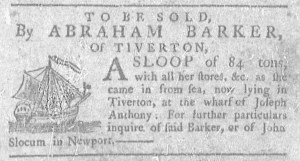GUEST CURATOR: Joseph Vanacore
What was advertised in a colonial American newspaper 250 years ago today?

“A SLOOP of 84 tons, with all her stores.”
I found Abraham Barker’s advertisement in the June 15, 1772, issue of the Newport Mercury very interesting. The shipbuilding industry was extremely important to the colonies and played a significant role in the economy of the New England—in this case, Rhode Island specifically. Ships were essential to the survival of the colonies in countless ways. The shipbuilding industry was a lucrative portion of the economy, while simultaneously supporting the lumber industry. Ships were used for transportation of people and goods, fishing, communication, and naval and coastal defense, as well as many other purposes. With a strong shipbuilding tradition, the colonies were able to encourage and achieve a strong mercantile tradition.
Barker’s advertisement told of the robust shipping industry of Newport, Rhode Island, as well as the surrounding towns, including Tiverton. The ports of Rhode Island were a valuable location for colonial commerce as well as arriving merchants from Britain, providing a hub of trade for the region. According to historians at the John Carter Brown Library, Rhode Island also played a major in the transatlantic slave trade, for a time accounting for the home ports of approximately 20% of all slave trading ships in continental North America. Rhode Island’s well-suited harbors and prime location between the ports of Boston and New York allowed the colony’s shipping and shipbuilding industries to flourish.
**********
ADDITIONAL COMMENTARY: Carl Robert Keyes
There are many pedagogical benefits to inviting students in my courses to serve as guest curators for the Adverts 250 Project and the Slavery Adverts 250 Project. They gain experience working with primary sources, pursuing independent research that incorporates both primary and secondary sources, identifying the significance of the advertisements they select, crafting an argument, writing, and revising. Throughout the entire process, they understand that they do not have an audience of one, the professor, as is the case with most assignments, but instead are making contributions to a digital humanities project consulted by fellow students, scholars, and the general public.
I ask students to select their advertisements but not to conduct too much research until I approve those advertisements for inclusion in the project. I wish to make sure that their advertisements fit within the general themes of the Adverts 250 Project. I also steer students away from any advertisements I suspect will be too difficult to research. In general, I recommend that these novice researchers choose advertisements that focus on a commodity or a service that helps to tell a story about commerce, politics, or everyday life in eighteenth-century America.
In previous semesters, students have often struggled when working with advertisements offering ships for sale, usually because they focused too much on the descriptions of particular ships. As a result, I initially told Joe that I was not certain that Abraham Barker’s advertisement about a sloop for sale was the best choice for this project, but I was open to learning more about why he selected it and what he hoped to accomplish before rejecting it and instructing him to find another advertisement. Joe then explained that he was not interested solely in this particular vessel but instead wanted to learn more about shipbuilding and shipping in New England, especially Rhode Island. Even before he commenced his research, he had ideas about the bigger picture, the larger significance of this advertisement, rather than getting bogged down in the details in the notice.
After that conversation with Joe, I enthusiastically approved the advertisement. I was even more pleased with the work Joe did for the Adverts 250 Project when he submitted a draft that incorporated Rhode Island’s prominence in the transatlantic slave trade, building on one of the central themes of a course that grappled with the tension between liberty and slavery during the era of the American Revolution. I doubt that I would have selected Barker’s advertisement to feature today, which makes me all the more pleased with the entry inspired by it that Joe has crafted. That underscored another aspect of students serving as guest curators that I especially enjoy. We work together as colleagues rather than only as teacher and student. Their ideas and contributions matter in our shared endeavor.
